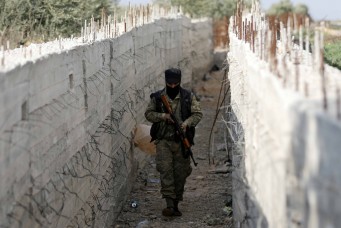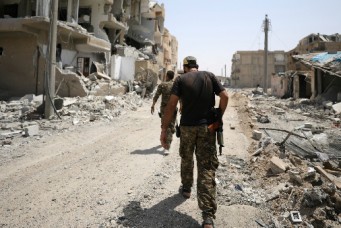The Meaning of Eastern Ghouta and Assad’s “Victory”
The Assad regime has won the war; it cannot, however, win the peace.

Children watch as an aid convoy of Syrian Arab Red Crescent drives through the besieged town of Douma, Eastern Ghouta, Damascus, Syria March 5, 2018. Bassam Khabieh/Reuters
Regional and international conflicting interests will make sure that Assad’s coming victory in the Syrian Civil War is a pyrrhic one. The butchered, suffering and dispersed Syrian people will not allow Assad to have a moment to rest on his laurels. It will be a long and painful road ahead but the future belongs to the champions of civil society and good governance in Syria. If the Eastern Ghouta tragedy proves anything, it is that the Assad regime’s survival has created the seeds of its own destruction. The regime has neither the ideological tools nor the independent ability to endure beyond the civil war.
At a little over 100-sq kilometers in size, Eastern Ghouta sits roughly 10 km east of central Damascus. Being within easy mortar range from the capital makes it an important target for the Assad regime to reclaim. However despite an almost complete siege and constant bombardment, the regime has failed to retake it over the past five years. The mix of Islamist forces in Eastern Ghouta include Jaish al-Islam, Failaq al-Rahman, Tahrir al-Sham, and Ahrar al-Sham. Despite conflict among these groups, they have proven themselves more than a match for Assad regime forces.
Now, with the end of the Syrian Civil War and military victory in sight, Assad has turned his full attention to Eastern Ghouta and Russia has stepped in to help—inflicting a reported 700 casualties since February alone. The nearly 400,000 civilians, half of whom are estimated to be children, are trapped in the middle and are at risk of total annihilation.
Syria’s Srebrenica moment has now arrived and the international community will have to intervene in one form or another to stop a much larger scale massacre this time. Conflicts among all the foreign powers involved will have to work themselves out. Already in the U.S. pressure is building for the U.S. government to play a larger role—even if diplomatic—in bringing an end to the Ghouta humanitarian disaster and not leave Russia and Iran fully in charge of much of Syria.
Lead-Up to the End Game
In 2013, when Hezbollah entered Syria and liberated the town of Qusair on the Lebanese border, the dye was cast. Active Iranian and Lebanese support would win the war for Assad no matter how long it took. This was made clear all the more when the U.S. decided not to intervene on behalf of the opposition and the GCC countries proved ineffective at doing so themselves.
In the face of a resilient opposition, however, and an emboldened Jihadi offensive, Russia entered the fray in 2015 and as Russia, Iran and Hezbollah were busy shoring up the Syrian regime, the U.S. stepped up its efforts to defeat ISIS in both Iraq and Syria—essentially doing Assad’s dirty work for him in order to stem the scourge that would, if successful in Syria and Iraq, infect the region and beyond.
It is now a matter of time before the last resistance against Assad fades completely and the anti-Assad fighters in Deir Ezzor, Idlib and Eastern Ghouta either accept a deal with the regime or are wiped out along with thousands of trapped civilians.
The endgame in Syria is that Assad will be left holding Damascus as Russian, Turkish, Iranian and pro-Iranian militias roam the countryside, limiting Assad’s reach and control. Regional super powers, including Israel and Russia, have now inserted themselves into Syria. These international powers on the ground have conflicting and enduring interests and despite temporary understandings, will find it hard to agree on any long term solutions to the Syrian dilemma.
Turkey, which desired a permanent foothold inside Syria since the beginning of the 2011 uprising, is now in Afrin and barring a successful U.S. intervention (either militarily or diplomatically) will likely insert its troops elsewhere in northern Syria, ostensibly to sever links of collaboration between the Syrian PYD and the Turkish PKK. Putin, meanwhile, is flush with his newfound power and—in the face of a complacent administration in Washington—is no doubt entertaining the possibility of a permanent presence in Syria. Iran and Hezbollah want, at all cost, to maintain the Iran-Syria-Lebanon connection through Iraq and their proximity to the Golan Heights. Indeed, as long as Israel has not made peace with the Palestinians and its Arab neighbors, dangerous confrontations with Iran and Hezbollah will continue.
Even if none of these fronts explodes into a full-fledged war, the tensions are likely to persist and international actors will carve out zones of influence over which the Assad regime will be weak, if at all present.
After the End Game
The Assad regime’s thuggery and medieval standards of governance will no longer work outside the Damascus enclave. The Syrians in country will have options and alternatives to Assad and will continue to strike deals with regional and international powers rather than submit again to a dictator from whom they’ve seen nothing but brutality. The Syrians in diaspora also have their options now, in particular the civil society leaders who have founded organizations and made professional links with think tanks, media and human rights organizations. Young social-media-savvy Syrians will continue to harass and hound the Assad regime from within and outside Syria to reform itself or be overthrown.
Here’s where civil society organizations and political activists will play a role: Internationally, they have to lead the campaign for intervention on behalf of the Syrian population. In the northern Kurdish areas, an agreement will have to be struck with Damascus (whether Assad continues to rule or be replaced by someone the Alaoui community picks to replace him). Arab Sunni communities on the northeastern borders with Iraq and those in Raqqa and the south will also exert pressure on Damascus not to take their loyalty to the regime for granted. Despite the harsh conditions of war and life under ISIS, Arab Sunni communities have now been free of regime control for seven years. As such, they are no longer cowered by Assad or government forces.
In short, the Assad regime will not find post-war Syria as easy to rule as the pre-war one. Also, the international environment will not easily accept the Syrian government back in its fold without changes. International and internal demands for change will provide the leverage that civil society leaders will be able to use to contain and ultimately change their government.
Nabeel Khoury is non-resident senior fellow with the Rafik Hariri Center for the Middle East at the Atlantic Council. On Twitter: @khoury_nabeel.





